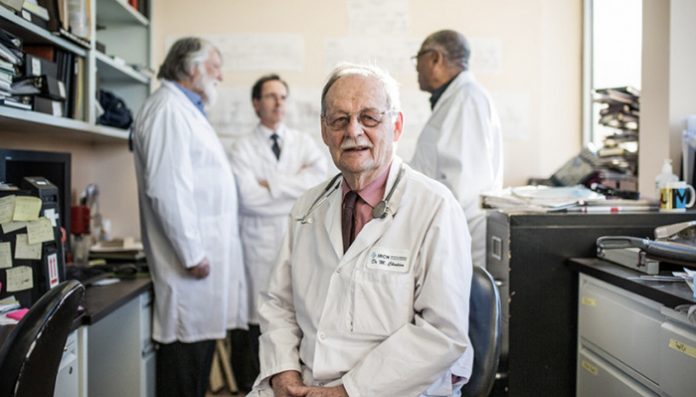
Fifteen years ago, a medical researcher named Michel Chrétien and his longtime collaborator Majambu Mbikay, a Congolese scientist, unhatched a theory in their Montreal laboratory. In the aftermath of the SARS epidemic that infected 8,000 patients in 26 countries, Chrétien and Mbikay, researchers at the Clinical Research Institute of Montreal (IRCM), began testing their idea that a derivative of quercetin, a plant compound known to help lower cholesterol and treat inflammatory disease—and common, at low doses, in over-the-counter medication—was a “broad spectrum” antiviral drug that could fight a range of viruses.
When an Ebola outbreak struck West Africa in 2014, the two scientists teamed up with the National Microbiology Laboratory in Winnipeg to test quercetin’s effectiveness on mice infected with Ebola—and found it effective even when administered only minutes before infection. It still needs to undergo clinical trials.
But when a new global health crisis erupted in Wuhan, China late last year, Chrétien and his team once again got to thinking. They believed the drug might work on COVID-19, which has infected nearly 80,000 people and killed 2,600, according to the World Health Organization. They knew a Swiss drug manufacturer, Quercegen Pharmaceuticals, could rapidly produce doses of the treatment in the hundreds of thousands.
The 84-year-old Chrétien was, for a time, the world’s seventh most cited scientist. His name runs atop more than 600 publications and he proudly affixes an Order of Canada pin to his lapel. His achievements rival those of his older brother Jean—an impressive claim given that particular sibling served as prime minister of Canada for a decade. Michel has almost certainly saved more lives in his time.
Michel Chrétien has a long-standing connection to high-level scientists in China. While a student at Berkeley University, he received some training from a Chinese researcher, Dr. C.H. Li, an enduring connection that saw him visit and work in China eight times starting in 1979. In the 1980s, Chrétien was an honorary professor at the Chinese Academy of Medical Sciences and Peking Union Medical College. In 1984, when he started a decade-long stint as president of the IRCM, he trained emerging scientists from China there. One of those relative youngsters was Chen Zhu, a molecular biologist who, back home in China, eventually entered politics and served as minister of health from 2007 until 2013. When a novel coronavirus outbreak exploded in China this past January, Chrétien contacted Zhu with an offer: “Can we help?”
Zhu contacted officials at the highest levels of the National Health Commission, the government agency managing the crisis. Word came back to Chrétien and his team in mid-February. Last week, they invited Chrétien’s team to start clinical trials in China. The plan: send samples of quercetin to the Chinese Academy of Sciences in Wuhan. The Canadian and Chinese scientists would collaborate on the trials, which would include about 1,000 test patients. Chrétien and Mbikay plan to join colleagues from the non-profit International Consortium of Antivirals—which Chrétien co-founded with Jeremy Carver in 2004 as a response to the SARS epidemic—in manning a 24/7 communications centre as soon as clinical trials go ahead.

The U.S.-based Food and Drug Administration has already approved quercetin as safe for human consumption, which means the researchers can skip testing on animals. If the treatment works, it’ll be readily available. Now Chrétien just needs the funding to start the trials. He estimates the teams need $5 million. But the payoff, he says, could be huge.
Chrétien’s team says their treatment would cost only $2 a day. They’ve spent weeks pursuing officials at Global Affairs Canada, including senior staff in the office of Foreign Minister Francois-Philippe Champagne. The request was then flipped to Health Canada. There’s no time to waste, says Chrétien. “I’ve been doing science all my life. I’ve stumbled on things my entire career, and this is probably the most urgent one I’ve been confronted with,” he says.
Quercetin isn’t the only possible treatment for COVID-19; Nature reported that 80 clinical trials on potential treatments are underway in China. But it remains one of the biggest potential leaps in finding a treatment for the deadly coronavirus strain; if it works, it could save thousands of lives.
Chrétien, who has spent most of his extensive medical career wearing a lab coat and testing hypotheses, simply touts the benefits of academic freedom as he and his team go about their work. “Basic science is worth doing for the sake of doing it, not knowing what the results will be in the short term or medium term,” he says. “Long-term returns can be big.”
Credit: McLeans. By Nick Taylor-Vaisey








